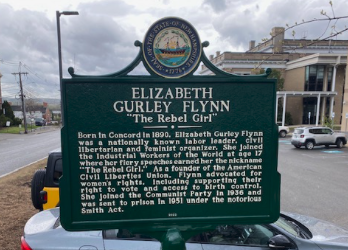This was an op-ed in the Concord Monitor that ran on May 19, 2023. View the original here.
She died in 1964, but her life has – once again – become a subject of intense political debate.
Earlier this month, the unveiling and subsequent removal of a historical marker commemorating Elizabeth Gurley Flynn made headlines. First, a complaint from an Executive Councilor. Then, Governor Sununu pledging action. Finally, the state removing the marker placed just two weeks prior.
Governor Sununu’s administration, which has reportedly been the driving force behind removing the marker, has failed to explain if and why they ordered it to be taken down–especially considering it was approved under the state’s own outlined process.
Moreover, this removal takes place as state legislators across the country, including in New Hampshire, move to censor the teaching of history when doing so becomes uncomfortable or politically inconvenient.
It begs the question: what is so threatening about acknowledging the relevance of a historical figure as to require immediate and unilateral action by the executive branch?
On May 1, longtime activists Arnie Alpert and Mary Lee Sargent unveiled in Concord the marker that commemorated the life of Elizabeth Gurley Flynn (1890-1964), a woman who fought tirelessly to advance labor rights and women’s equality throughout her life. Flynn was born in New Hampshire.
The marker, white text on a dark green background, looked like the nearly 300 other markers signifying people of historical significance that can be found across the state. Flynn’s marker, the product of years of work, was born out of the state’s same policy as others. It began with a public petition, received approval from a state agency, and then that state agency sought approval from the Concord Heritage Commission and the Concord City Council.
Yet her marker is the one that has now become a focal point of political controversy.
Controversy was something that Flynn attracted throughout her life, and the irony of this situation is not lost in the latest round. She achieved prominence at an early age as an advocate for labor and for women’s equality, was a staunch civil libertarian who later was one of the founding members of the national American Civil Liberties Union (ACLU), and eventually became a leader in the Communist Party in the United States amidst the second “Red Scare,” for which she was imprisoned.
The ACLU expelled her from its board in 1940 due to her political affiliations with the Communist Party. But the organization realized this was a mistake, and reinstated her posthumously in 1976, stating in the meeting minutes as covered in the New York Times that Flynn’s expulsion “contradicts our basic opposition to guilt by association,” and that, “the ACLU judges the individual and is not a red‐baiting group.”
It is frustrating to see the State of New Hampshire repeating the same mistake the ACLU once made by attempting to erase the relevancy of Flynn’s history because of an association it finds distasteful.
Elizabeth Gurley Flynn’s marker, one of only 12 commemorating women in New Hampshire, was certainly not the only marker in the state that could be viewed as “controversial.”
This sentiment was plainly acknowledged by Department of Natural and Cultural Resources Commissioner Sarah Stewart, who oversees the marker program. During an Executive Council meeting in May, Commissioner Stewart stated, “The purpose of them [the markers] is not to commemorate heroes…the purpose is to provide a snapshot that the local community feels is of historic value.”
While one may agree or disagree with various aspects of Flynn’s legacy, the abrupt removal of a historical marker raises concerning questions about censoring history if and when it proves to be politically inconvenient or uncomfortable. Granite Staters deserve answers as to why the state is censoring this marker after it was approved through the government’s own uniform, neutral process for the creation of markers that educate the public about New Hampshire history.
It is clear and undeniable that Elizabeth Gurley Flynn’s contributions to history are significant. She was even profiled in the Concord Monitor’s 2001 publication The New Hampshire Century, which profiled 100 of the state’s most interesting historical figures of the twentieth century.
And so we ask Governor Sununu to tell Granite Staters: why did the state remove this specific marker, and why change a process which invites the public to propose markers of historical significance to one which appears to be controlled by the whims of whomever holds political power?
What is so dangerous about Granite Staters learning about Flynn’s legacy and judging it on its own merits? Do Granite Staters need the Governor’s Office to determine what parts of history are worth learning? Or are we going to trust New Hampshire residents to be able to take in the full and complicated history of our state and make their own judgements?
Amidst a national debate about content censorship, Granite Staters are fully capable of judging Flynn on their own.
The ultimate irony here is, of course, that because of the controversy created by the Executive Councilors and the Sununu administration, many more people in the Granite State and across the country have now learned about Flynn’s legacy. They likely never would have if the marker had been left alone.
